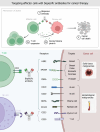Research progress of tumor-associated macrophages in immune checkpoint inhibitor tolerance in colorectal cancer
- PMID: 39473964
- PMCID: PMC11514660
- DOI: 10.4251/wjgo.v16.i10.4064
Research progress of tumor-associated macrophages in immune checkpoint inhibitor tolerance in colorectal cancer
Abstract
The relevant mechanism of tumor-associated macrophages (TAMs) in the treatment of colorectal cancer patients with immune checkpoint inhibitors (ICIs) is discussed, and the application prospects of TAMs in reversing the treatment tolerance of ICIs are discussed to provide a reference for related studies. As a class of drugs widely used in clinical tumor immunotherapy, ICIs can act on regulatory molecules on cells that play an inhibitory role-immune checkpoints-and kill tumors in the form of an immune response by activating a variety of immune cells in the immune system. The sensitivity of patients with different types of colorectal cancer to ICI treatment varies greatly. The phenotype and function of TAMs in the colorectal cancer microenvironment are closely related to the efficacy of ICIs. ICIs can regulate the phenotypic function of TAMs, and TAMs can also affect the tolerance of colorectal cancer to ICI therapy. TAMs play an important role in ICI resistance, and making full use of this target as a therapeutic strategy is expected to improve the immunotherapy efficacy and prognosis of patients with colorectal cancer.
Keywords: Colorectal cancer; Immune checkpoint inhibitor resistance; Review; Tumor microenvironment; Tumor-associated macrophages.
©The Author(s) 2024. Published by Baishideng Publishing Group Inc. All rights reserved.
Conflict of interest statement
Conflict-of-interest statement: All the authors report no relevant conflicts of interest for this article.
Figures






References
Publication types
LinkOut - more resources
Full Text Sources
Research Materials

